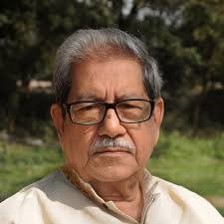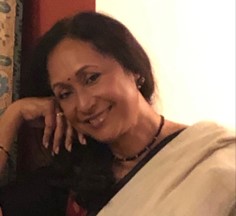Translated from the Bengali by Sharmila Das Gupta Sen
What remains of your eyes after 25 years of clerkship? Poor eye sight has been a constant companion since seventh grade when eyeglasses became a part of his existence. The storm a few days back had forced the shutters on the window to fly open and his thick-lenses crashed to floor. He could have fixed them by tying a string to the temples but Saleh had tripped on the bed, upright and high on bricks, and trampled them.
Mr. Sadat hopes to replace his eyeglasses – he just doesn’t know when. His pension is irregular. Asaad’s salary barely covers family expenses. Saleha’s wedding is on hold because of their constrained financial situation, but, by Allah’s grace, Asaad and his wife are expecting their first child.
But Mr. Sadat feels his wrecked spectacles have rendered him blind because don’t humans need sight to feel whole? He rarely leaves home but now gloom rules home as well. Is this living? Sometimes he envies those who do not have the power of speech for their sight, but, then again, he reminds himself that sight without speech is inadequate, too. Mr. Sadat deliberately sets aside this disquiet and calls out, “Saleh dear, can you bring me paan?”
Hasina, Asaad’s wife, comes in Saleha’s stead and Mr. Sadat, recognizing her voice, probes, “Where is Saleha?”
“She is in her room.”
Mr. Sadat admonishes her gently, “You need to slow down now, my dear.”
Hasina smiles at this affectionate reproach. She knows how good, how loving, her father-in-law is. She knows the hope that he nurtures. She changes the topic. “You should have replaced your spectacles. There’s some saving, you know. We could have used that and borrowed a bit. We would have repaid next month.” Mr. Sadat smiles his response, “We need to have some ready cash under current circumstances. My dear, you have done enough for this old man. Now you need to think about the newest member about to join the family.” Hasina retreats as Saleha rushes in.
“Abba,” she exclaims. “Do you know what has happened?”
“What, dear?”
“Police have fired on the medical students agitating to speak in their mother tongue.”
“Really? Fired?” Mr. Sadat queries in disbelief.
“Yes, gunshots. They fired when tear gas, baton charges, and arrests failed to stop the rebellion. Six have been killed and several injured.”
“Who told you this?”
“Bachchu. He was there until the firing started.”
“Incredible,” says Mr. Sadat, fully alert to the reality now. Was British rule worse than this, these frequent shootings that define their world now, wonders Mr. Sadat.
“Are we all supposed to become mutes now?” exclaims Saleha as she stomps out.
Alone in his room now, Mr. Sadat ponders on the state of the world. Other considerations meander into this disquiet.
Asaad interrupts his tortuous thoughts and Mr. Sadat asks, “Is it true that six people have been shot dead?”
Asaad sinks into his seat, “Yes.”
Mr. Sadat yields to his painful deliberations yet again.
As he wakes up, Mr. Sadat calls out for Asaad. Instead, Saleh answers, “He has left for work.”
“Isn’t this too early in the morning for that?”
“It isn’t too early, and any way, it is Friday, and work starts early.”
Mr. Sadat digests this as he realizes that he had spent much of last night counting the hefty treads of heavily armed soldiers and had woken up much later than usual. Saleha, handing Mr. Sadat his morning tea, says, “There is a threat of a strike at Bhai’s office. He is going to try his best to avoid that but, Father, what will happen if he loses his job?” Saleha, despite all attempts to remain hopeful, cannot completely mask her despair.
Mr. Sadat responds abstractedly, “I don’t think that’ll happen.” His own comforting assurances fail to offer him succor, however. That’s the human lot – agonizing.
It is eerily quiet outside. The roads are almost empty of everyone and everything. Those who have to be outside are carefully avoiding walking in large crowds. The specter of death seems to shroud the surroundings, but this shroud is not that of peaceful death. It cannot mask the underlying anticipation in the air.
His musings remind Mr. Sadat of his own mortality. Who will remain when he dies? Will Asaad die too? And then? Asaad’s children. He tries to calm himself. His thoughts about his prospective grandchildren, the continuation of his bloodline, offer a measure of comfort, warming him, his heart.
There’s a knock on the door. Who can that be? He asks Saleha to open the door. He can hear her greeting, “How’s it going, Halimbhai?” He cannot hear their neighbor Halim’s response, though. Halim and Asaad work together. What’s up, he wonders.
He hears footsteps and Hasina and Saleha’s wails. He calls out to them as he reaches for his slippers but can’t move forward because of his missing spectacles. Saleha comes in, sobbing, “Bhai has been shot. He is dead!” He can hear Halim’s, “The office was marching in protest when we were fired on. Asaad died instantly. We took him to the doctor’s chambers because we thought the hospital would not release the body, but it was too late. We have brought him home.”
Saleha assists Mr. Sadat out of his room, crying inconsolably. Hasina is embracing Asaad’s body in anguish.
Her baby reacts in her womb, Hasina imagines.
Mr. Sadat breaks down as he touches his son’s body tenderly. He is straining to see, “I can’t see anything. Where is Asaad? I can’t see anything.” Darkness enshrouds his sight, and this darkness will never, ever go away. Will he never be able to see again? Even his grandchild?
He tries to compose the image of Hasina’s unborn child, his grandchild. He tries to see the baby in his heart. And his sorrow appears to abate.



























A poignantly beautiful story! The translation is superb and is able to bring to the readers the gentle struggles of Mr. Sadat’s everyday life. The words she has chosen are without rancor or harshness and conveys the mood of narrative perfectly. Kudos to the writer and translator.
One powerful and a beautiful, touching story!
Moreover, I loved your translation Pinky!!
I always say that you write darn well.
Beautifully written. I am not able to appreciate the original in Bengali, but this translated version has taken me in to the depth and emotions of the narrative in a way that I’m sure the author would have hoped for.
A piece most appropriate to remind us of the language movement. The translator has taken pains to relive the sentiments created by the original. The metaphor of the unborn child is quite hard hitting.
While I haven’t read the original, the sentiment of the story comes through very well in the translation. The sorrow this family has been plunged into with the sudden news the neighbour brings, becomes palpable for the reader.
Well crafted translation
A spontaneous, free flowing, lucid translation keeping the taste and flavour of the original. The struggle and emotions of the story are very touching and are exactly brought out in the translation.
Unfortunately I haven’t read the original. This translated version touched my heart. Well done Pinkie. I am looking forward for more.
Awesome story and wonderfully translated . I could feel every emotional aspect of this story and brought tears to my eyes . Looking forward to more translated stories by you Sharmila .
I also didn’t read the original by Dr. Anusuzzan, but didn’t seem to miss it. Credit goes to the translator’s proficiency in both language and her eloquent expressions of the inner feelings of a person who lost the ability to see with his naked eyes. Excellent piece of work, Pinki di!
Dear Pinkie, I am delighted to read your translation of a story (Vision) by Professor Anisuzzaman. I did not read the original story in Bangla but that did not stand in the way of my enjoying and appreciating the story as you translated it with great skill and emotion which made it read like it was written originally in English. It is a beautiful translation, very fluent and natural in its presentation and expressions. My compliments and congratulations. I knew Professor Anisuzzaman well during my student days. He was a most respected teacher, scholar and writer, and a deeply admired literary and cultural icon, who will also be lovingly remembered for his progressive views and his proactive support to the socio-political and cultural movements which culminated in the establishment of our independent nation of Bangladesh. I am very pleased that you chose to translate one of his stories. Well done, Pinkie! Best wishes. Basharat
I congratulate you Pinkie on your brilliant short story which seems your own and not a translation.
Every character has been so vividly portrayed by you and the story flowed so lucidly in your words to grasp the events in sequence that it touched our hearts with immense sadness.
The plight of the father in a helpless situation, the soft natured daughter in law were so well described.
The unknown future of the yet to be born which is so heart wrenching was so well expressed.
The horrors of 1952, the killing and death of innocent Bengalees all for the desire of their mother tongue to be state language has been very well depicted.
I have not read the original but Sharmila’s translation has given me a wonderfully recreated version of it. She has retained the moods of Bangla by carefully choosing her words which is a feat in itself
Beautifully done. Even without being familiar with the original work, I was transported to a world of distinctive feelings, uncertainty and compromise. A palpable sense of doom is effortlessly created with the superb choice of precise words, and style. The tragedy at the close is almost visual. Very impressive work.